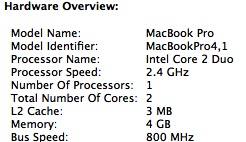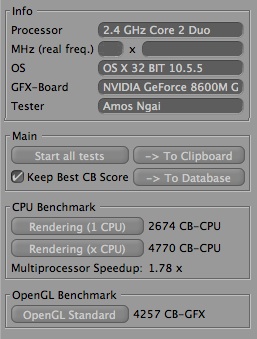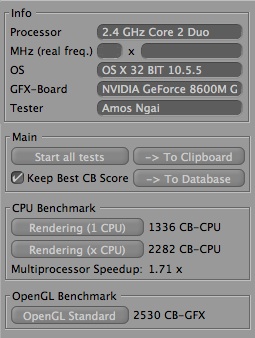MacBooks Run Slow Without Battery
A new "Power Saving Feature" in the unibody MacBook and MacBook Pros was inadvertently discovered by Gearlog while they were doing a routine benchmark.
Gearlog was benchmarking was to test third party RAM modules for use in the new MacBook Pros, but discovered that the notebook’s processing power significantly decreased after the battery was removed during the test. It was confirmed that Apple does indeed scale back the CPU processing speed while operating on AC power without a battery installed.
According to this support document, Apple essentially down-clocks the CPU to prevent the system from shutting down if it happens to demand greater power than the AC adapter alone can provide: "If the battery is removed from a MacBook or MacBook Pro, the computer will automatically reduce the processor speed. This prevents the computer from shutting down if it demands more power than the A/C adapter alone can provide."
Collaboration from other users can be seen on the Gearlog comments; however, since this support document was last updated in August 2008, I decided to do some independent testing on my own MacBook Pro. I wanted to see if this problem existed in late model MacBook Pros or were they limited to only the new unibody MacBook Pros. Using the same Cinebench R10 benchmarking software, I conducted the full tests three times each with the WiFi and Bluetooth radio disabled and carrying forward the best scores achieved each time.



MacBook Pro performance with battery on left; performance without battery on right.
Gearlog’s own results show a decrease of 36 percent in processor speeds without a battery attached on their unibody MacBook Pro. Our own tests show a decrease of 50 percent when rendering with one CPU, a decrease of 52 percent in multiprocessor rendering, while the GPU suffered a 40 percent decrease in performance.
What does Apple have to say about this? The official statement from its support document is that “It is strongly recommended that you do not use your MacBook or MacBook Pro while the battery is removed.”
The only benefit in operating a notebook without its battery is to conserve charge cycles and thereby extending the battery life. Apple recommends that with notebook batteries, occasional power flow is necessary for its longevity. Standard maintenance is not to constantly keep the battery charged but rather allow it to discharge partially before recharging it again. If your use is infrequent, it is recommended that the battery be completely discharged and recharged once per month.
With such drastic performance decreases on a previous generation Macbook Pro, it doesn’t seem logical to remove the battery when a brand new battery can be purchased for $129 from Apple or possibly even less from other resellers. I would rather have a full powered notebook and a few months less with my battery than the alternative.
Get Tom's Hardware's best news and in-depth reviews, straight to your inbox.
-
Reply
Standard maintenance is not to constantly keep the battery charged but rather allow it to discharge partially before recharging it again. If your use is infrequent, it is recommended that the battery be completely discharged and recharged once per month.
Another bull-shit explenation.
Li-ion batteries need no discharge, and complete discharge is what destroys them fastest!
I suggest the person talking about batteries knows not of what he talks.
Otherwise, strange to see that an apple would do the clockdown.
It can be prevented by having (or investing) in a more powerfull adaptor!
I guess that's the cost of saving huh? -
I've had my Compaq laptop for about 3 years, and the original battery has only decreased in capacity maybe 7%. I can attribute that to removing the battery and using it only so often, while enjoying full processing power plugged into AC. If used in conjunction with a good UPS, there is no reason to have this type of scaling back design. If it's because of the AC adapter's 85 watt output, they should have made a better one, it's not as if Apple makes products geared for the thrifty consumers.Reply
-
So what I'm reading into this is users who happen to have a 2-3 year old battery and don't want to replace it will receive a performance penalty? That's utter crap!Reply
A laptop AC adapter must provide more than enough power to run (and here's the important part) *and* charge the battery simultaneously. This always leaves enough headroom to ensure there's enough power.
I reject Apple's notion that a MacBook Pro without a battery will draw more power than the AC adapter it shipped with.
In some *strange* case where a user has a 3rd party AC adapter, this might be helpful; and if a Mac user called Apple to complain about it, the first thing Apple Tech Support will say is "Do you have an Apple-supplied AC Adapter?" "No?" "We cannot support your configuration, let me direct you to sales so you can buy an apple-certified part."
Any questions? -
Nguy battery discharge can be confirmed by Apple's own user guide found here: http://www.apple.com/batteries/notebooks.htmlReply
If on the other hand, you use a desktop computer at work, and save a notebook for infrequent travel, Apple recommends charging and discharging its battery at least once per month.
-
I wonder if the same holds true if the macbook is running vista/xp/Linux???? whether it is a software switch or built into the hardware?Reply
-
For god sake! Who the hell believe that Apple only wants to prevent the computer from shutdown when not having the battery? It's a clear way to force deprecation on old notebooks as their batteries become inoperable faster. And I read about this "policy" one year and half ago. I just can't believe that Apple can't do a powerful enough adapter but prefers that the commercial clockwork keeps going.Reply
-
nukemaster So if the power adapter can not run the notebook on its own, how the hell does it change it? Does encoding a video on it have to draw into the batter eventually killing it? Something is not right.Reply
The macbooks should not even need that much power. -
resonance451 Keep in mind that li-ion batteries are not the same as the older nickel-based batteries.Reply -
brendano257 I think it was a legitimate concern when building and programming the laptop, but I think the editor could have possibly made a better title, I read this because I looked at the title and though "Really does it now?"Reply -
lbjack The CPU power is cut because the AC adaptor can't support it? The CPU needs both AC AND battery power to fully work? There is either super incompetence here or some kind of ridiculous battery scam going on, as suggested by another post. This is the most assinine thing I've ever heard!Reply

